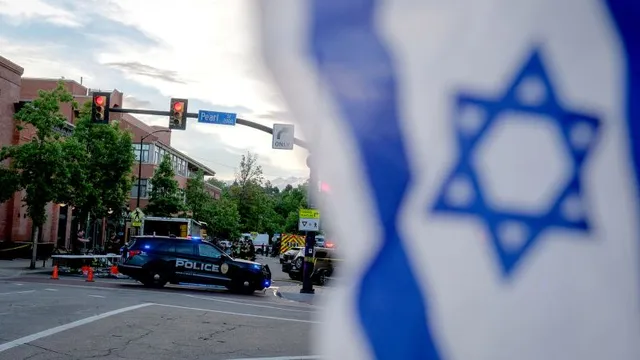
Suspect charged with murder after Boulder attack on pro-Israel group
2025-06-05 22:25- Authorities report that Mohamed Sabry Soliman allegedly used a flamethrower and incendiary devices to attack a pro-Israel rally.
- Witnesses described the scene as chaotic with multiple injuries, prompting emergency responses.
- The incident has raised significant concerns over increasing antisemitism and targeted violence in the community.
Express your sentiment!
Insights
In Boulder, Colorado, on an unspecified weekend day, an act of violence occurred during a rally organized in support of Israeli hostages held by Hamas. The event, which aimed to raise awareness about the plight of the hostages, was interrupted when the suspect, identified as 45-year-old Mohamed Sabry Soliman, allegedly utilized a makeshift flamethrower and threw incendiary devices into the crowd. Witnesses described a chaotic scene as attendees attempted to help those who were injured from burns and direct assault. Initial reports stated that several individuals, including the suspect, suffered serious injuries, prompting a swift response from law enforcement. Mohamed Soliman was detained at the scene and later identified as a focal point of the investigation led by the FBI. Investigators later searched his apartment in Colorado Springs, confirming that he lived there with his family. The FBI declared the attack a targeted act of violence against a pro-Israel group, underlining the growing concerns regarding antisemitism in the United States. Authorities reported that a total of eight people were injured during this violent incident, raising significant alarm over the increasing occurrences of targeted attacks based on political and religious lines. As the investigation unfolded, Soliman was found to be in the U.S. illegally from Egypt, further complicating the legal ramifications surrounding the case. His connection to extremist ideologies may have played a role in the violent outburst, which took place mere hours before the Jewish festival of Shavuot began—an intersection notable for its implications. Multiple lawmakers condemned the attack, emphasizing the need for bipartisan action to combat rising antisemitism. The urgency of addressing targeted hate crimes was particularly underscored by the senators' calls for greater moral clarity and active resistance against growing intolerance. Mohamed Soliman's case exemplifies the challenges authorities face in monitoring threats and preventing violence stemming from extremist beliefs. Following his detention, he remained in custody with a notably high bond set at $10 million, with his first court appearance already scheduled. The community, shaken by the incident, has initiated discussions on ways to ensure safety during peaceful assemblies aimed at promoting unity and solidarity. As events unfold, the impact of this incident continues to reverberate among community leaders and activists alike, highlighting the fragility of societal peace and the critical need to confront and address hate-based violence.
Contexts
The impact of the Boulder attack on community safety cannot be understated, as it serves as a stark reminder of the vulnerabilities that can exist in even the most familiar settings. This incident, which drew significant public attention and concern, highlighted the complexities surrounding safety in public spaces and the ongoing need for community vigilance. The immediate aftermath was characterized by a palpable sense of fear and uncertainty among residents, many of whom questioned their safety and the effectiveness of local security measures. Discussions around community safety shifted into focus, prompting residents, local leaders, and law enforcement to engage in deeper conversations about the nature of threats that communities face in a rapidly evolving social landscape. In the wake of the attack, there was a noticeable increase in community solidarity as residents sought to support each other, fostering a sense of unity in the face of adversity. Events were organized to honor victims, facilitate open dialogues about safety concerns, and promote a message of resilience within the community. Local authorities responded by enhancing security protocols in public spaces, increasing police presence, and improving communication channels between law enforcement and community members. This response underscored a collective commitment to not only improve safety measures but also to maintain a sense of normalcy and trust within the community. Moreover, the attack provoked a broader discussion about mental health resources available to the community. The psychological impact of such events can reverberate far beyond the immediate response. Community leaders recognized the importance of providing support mechanisms, including counseling services and mental health workshops, to address the emotional effects on individuals and families affected by the incident. This proactive approach emphasized the need for comprehensive strategies that address both physical safety and the mental well-being of community members, ensuring that the community can collectively heal and emerge stronger. Ultimately, the Boulder attack served as a critical catalyst for re-evaluating existing safety protocols and fostering community engagement. As residents continue to navigate the complexities of safety in a post-incident environment, the emphasis on preparedness, resilience, and mental health support must remain at the forefront of community initiatives. Building a safer community will require ongoing collaboration between residents, local leaders, and law enforcement to develop effective strategies that not only address immediate safety concerns but also promote a long-term culture of vigilance and cohesion. Through these efforts, the community can transform a tragic event into an opportunity for growth and strengthened bonds.